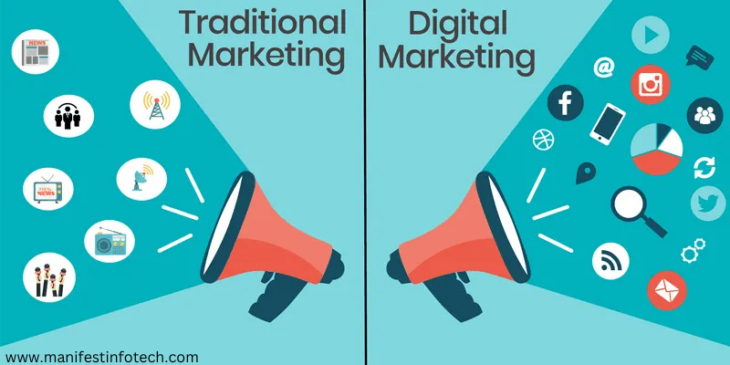
In this blog post, we’ll delve into the key differences between digital marketing and traditional marketing to help businesses understand their distinct advantages and choose the right strategies for their marketing efforts.
𝟏. 𝐑𝐞𝐚𝐜𝐡 𝐚𝐧𝐝 𝐓𝐚𝐫𝐠𝐞𝐭𝐢𝐧𝐠:
– 𝐓𝐫𝐚𝐝𝐢𝐭𝐢𝐨𝐧𝐚𝐥 𝐌𝐚𝐫𝐤𝐞𝐭𝐢𝐧𝐠: Traditional marketing channels, such as television, radio, newspapers, and magazines, offer broad reach but limited targeting capabilities. Messages are broadcasted to a mass audience without the ability to tailor them to specific demographics or interests.
– 𝐃𝐢𝐠𝐢𝐭𝐚𝐥 𝐌𝐚𝐫𝐤𝐞𝐭𝐢𝐧𝐠: Digital marketing platforms, such as social media, search engines, email, and websites, provide highly targeted advertising options. Businesses can segment their audience based on demographics, interests, behaviors, and preferences, ensuring that messages reach the right people at the right time.
𝟐. 𝐂𝐨𝐬𝐭 𝐚𝐧𝐝 𝐑𝐎𝐈:
– 𝐓𝐫𝐚𝐝𝐢𝐭𝐢𝐨𝐧𝐚𝐥 𝐌𝐚𝐫𝐤𝐞𝐭𝐢𝐧𝐠: Traditional marketing campaigns often require substantial financial investment, especially for television ads, print media, and billboards. Measuring return on investment (ROI) can be challenging, as it’s difficult to track the effectiveness of offline advertising efforts accurately.
– 𝐃𝐢𝐠𝐢𝐭𝐚𝐥 𝐌𝐚𝐫𝐤𝐞𝐭𝐢𝐧𝐠: Digital marketing offers more cost-effective solutions, with options for businesses of all sizes and budgets. Online advertising platforms typically operate on a pay-per-click or pay-per-impression model, allowing businesses to set specific budgets and track performance metrics in real-time, enabling better ROI analysis.
𝟑. 𝐄𝐧𝐠𝐚𝐠𝐞𝐦𝐞𝐧𝐭 𝐚𝐧𝐝 𝐈𝐧𝐭𝐞𝐫𝐚𝐜𝐭𝐢𝐨𝐧:
– 𝐓𝐫𝐚𝐝𝐢𝐭𝐢𝐨𝐧𝐚𝐥 𝐌𝐚𝐫𝐤𝐞𝐭𝐢𝐧𝐠: Traditional marketing methods are one-way communication channels, where businesses deliver messages to consumers without immediate feedback or interaction. Engagement levels are generally lower, as there’s limited opportunity for audience participation.
– 𝐃𝐢𝐠𝐢𝐭𝐚𝐥 𝐌𝐚𝐫𝐤𝐞𝐭𝐢𝐧𝐠: Digital marketing fosters two-way communication and engagement between businesses and consumers. Social media platforms, in particular, encourage dialogue, feedback, and interaction, allowing businesses to build relationships with their audience, address customer inquiries, and gather valuable insights.
𝟒. 𝐅𝐥𝐞𝐱𝐢𝐛𝐢𝐥𝐢𝐭𝐲 𝐚𝐧𝐝 𝐀𝐝𝐚𝐩𝐭𝐚𝐛𝐢𝐥𝐢𝐭𝐲:
– 𝐓𝐫𝐚𝐝𝐢𝐭𝐢𝐨𝐧𝐚𝐥 𝐌𝐚𝐫𝐤𝐞𝐭𝐢𝐧𝐠: Traditional marketing campaigns often require extensive planning and production time, making it challenging to adapt quickly to changing market conditions or consumer trends. Modifications or updates to advertisements can be time-consuming and costly.
– 𝐃𝐢𝐠𝐢𝐭𝐚𝐥 𝐌𝐚𝐫𝐤𝐞𝐭𝐢𝐧𝐠: Digital marketing campaigns offer greater flexibility and agility, allowing businesses to make real-time adjustments based on performance data and market feedback. Ad creatives, targeting parameters, and campaign strategies can be modified instantly, enabling businesses to stay agile and responsive in dynamic environments.
If you are looking for any services related to Website Development, App Development, Digital Marketing and SEO, just email us at nchouksey@manifestinfotech.com or Skype id: live:76bad32bff24d30d
𝐅𝐨𝐥𝐥𝐨𝐰 𝐔𝐬:
𝐋𝐢𝐧𝐤𝐞𝐝𝐢𝐧: linkedin.com/company/manifestinfotech
𝐅𝐚𝐜𝐞𝐛𝐨𝐨𝐤: facebook.com/manifestinfotech/
𝐈𝐧𝐬𝐭𝐚𝐠𝐫𝐚𝐦: instagram.com/manifestinfotech/
𝐓𝐰𝐢𝐭𝐭𝐞𝐫: twitter.com/Manifest_info
#DigitalMarketing #TraditionalMarketing #MarketingStrategy #OnlineMarketing #OfflineMarketing #Advertising #DigitalAdvertising #TraditionalAdvertising #MarketingComparison #MarketingChannels #TargetAudience #ROI #Engagement #Interaction #Flexibility #Adaptability #BusinessStrategy #MarketingTactics #MarketingTips #MarketingInsights